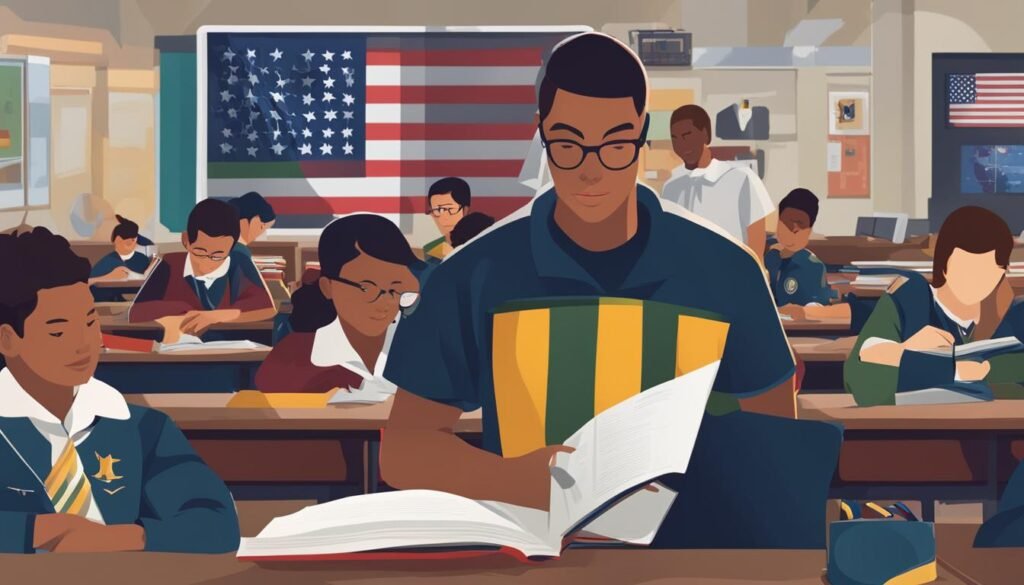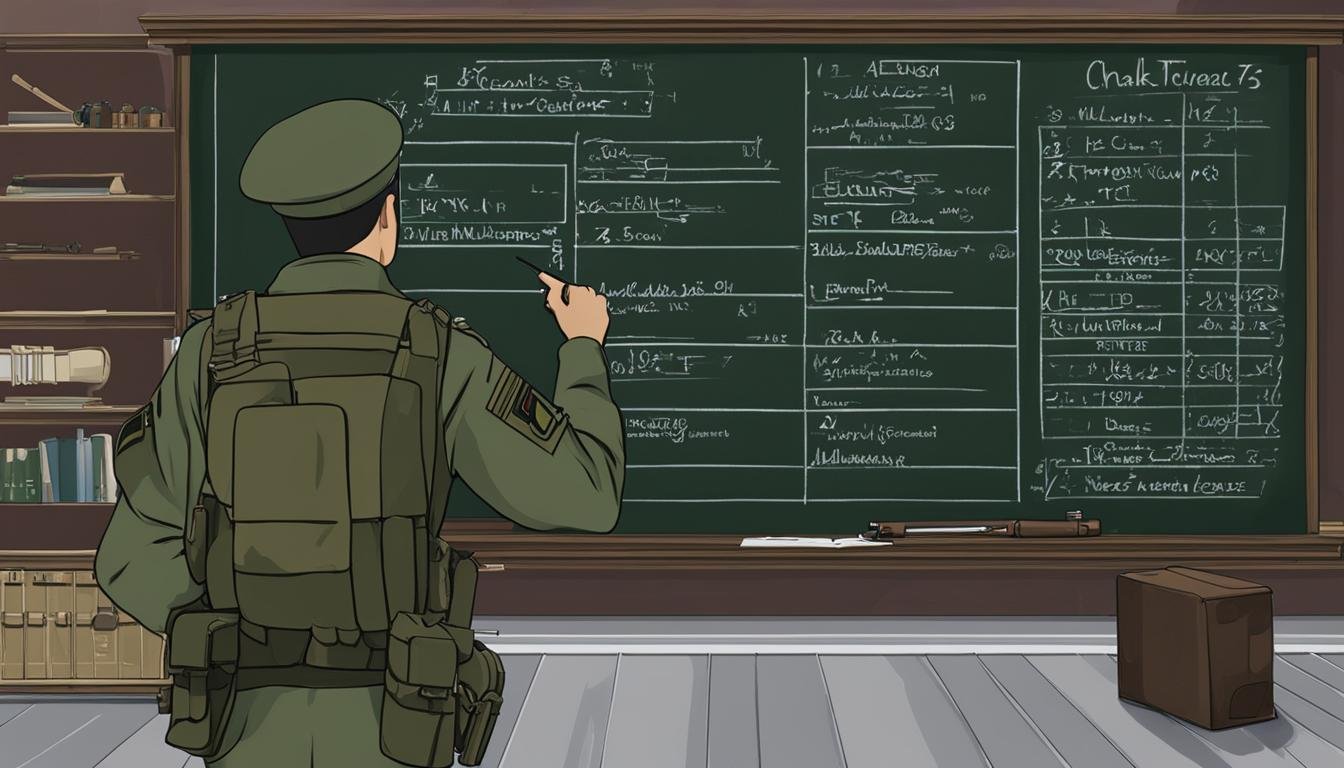Military service can have a profound impact on academic progression and performance. The experiences gained through military service, as well as the unique challenges faced by service members, can shape one’s educational journey in various ways.
From its early beginnings in colonial times to the enactment of the GI Bill, the connection between military service and higher education has been longstanding in the United States. The GI Bill has provided education benefits to veterans, opening doors to postsecondary enrollment and increasing the overall educational attainment of service members.
However, there is a need for empirical evidence to understand the precise impact of military experience on education. While the American Council on Education (ACE) recommends credit for prior learning based on military training, its influence on academic success for student veterans requires further examination.
Key Takeaways:
- Military service has a significant impact on academic progression and performance.
- The GI Bill has played a crucial role in connecting military service and higher education.
- Empirical evidence is needed to understand the precise impact of military experience on education.
- The American Council on Education (ACE) recommends credit for prior learning based on military training.
- Further research is necessary to evaluate the effectiveness of credit recommendations for student veterans.
The Effects of Military Life on Children’s Academic Performance
Children with at least one military parent often face unique challenges in the classroom. Relocation and deployment, common aspects of military life, can have significant effects on their academic performance. Frequent moves can disrupt their school routines and relationships, leading to difficulties in adjusting to new environments. Deployments can cause emotional and behavioral problems among children, impacting their ability to focus and engage in school. Military children may also experience a lack of understanding and support from teachers who are unaware of the challenges they face. It is important for educators to be aware of these issues and provide appropriate support to help military children succeed academically.
According to a study conducted by the Military Child Education Coalition, military-connected students experience higher rates of school transitions compared to their peers. The study found that military children, on average, move six to nine times during their K-12 education. These frequent moves can lead to academic disruptions and gaps in learning, as children have to continually adjust to new curricula, teaching styles, and social dynamics. The stress and uncertainty associated with relocation can also contribute to anxiety, depression, and other mental health issues among military children, further impacting their ability to perform well academically.
Another challenge military children face is the absence of a parent due to deployments. The prolonged separation and uncertainty can be emotionally challenging for children, leading to feelings of sadness, anxiety, and loneliness. These emotional struggles can manifest in various ways in the classroom, including difficulties concentrating, behavior problems, and decreased motivation. Additionally, military children may not receive the same level of support from teachers who may not fully understand the unique circumstances and stressors that military families face. This lack of understanding and support can further hinder their academic progress.
“Military children often experience significant disruptions in their education due to frequent moves and the emotional toll of deployments. These challenges can have a profound impact on their academic performance and overall well-being,” says Dr. Sarah Jones, a child psychologist specializing in military families.
| Challenges Faced by Military Children in School | Effects on Academic Performance |
|---|---|
| Frequent relocations | Disruptions in school routines, challenges in adjusting to new environments |
| Deployments of military parent | Emotional and behavioral problems, difficulties concentrating and engaging in school |
| Lack of understanding and support from teachers | Decreased motivation, potential academic setbacks |
Recognizing and addressing the unique challenges faced by military children is crucial for ensuring their academic success. Schools and educators can implement strategies such as providing extra support services, creating a welcoming and inclusive environment, and offering counseling resources for military children. Collaboration between schools, military organizations, and parents is also important in advocating for the needs of military-connected students and fostering a supportive community.
Strategies for Supporting Military-Connected Students in Higher Education

Military-connected students face unique challenges when pursuing higher education. To ensure their academic success, it is important to provide them with the necessary support and resources. Here are some strategies that can be implemented:
1. Effective Recognition and Credit for Military Experience
Many military-connected students have acquired valuable skills and knowledge through their service. Recognizing and giving credit for their military experience can help them progress academically. Higher education institutions should review military transcripts and consider granting credits for relevant courses or experiences. This recognition not only saves time and money for the students but also acknowledges their expertise and contributions.
2. Compliance with State Policies on ACE Credit Recommendations
The American Council on Education (ACE) provides credit recommendations for military training and experience. These recommendations are intended to translate military skills and knowledge into academic credits. Higher education institutions should ensure compliance with state policies regarding the acceptance of ACE credit recommendations. This consistency across institutions will enhance the transferability of credits and facilitate the academic progress of military-connected students.
3. Tailored Support Services
Military-connected students often have unique needs and experiences. Providing them with tailored support services can greatly contribute to their academic success. These services may include dedicated advisors who understand the challenges faced by military-connected students, mental health counseling specifically for military-related stressors, and peer support groups where students can connect with others who share similar experiences. Additionally, career services that specialize in assisting military-connected students with their transition to civilian careers can be invaluable.
By implementing these strategies, higher education institutions can create a supportive environment that improves the academic outcomes of military-connected students. Collaboration between institutions, military organizations, and government agencies is crucial in developing and implementing these initiatives. Further research and data collection are also needed to evaluate the effectiveness of these strategies and identify areas for improvement.
How Does Military Service Affect Academic Progression for Students?
Many student reviews militaryfriendly colleges have shown that military service can have a positive impact on academic progression for students. The discipline, leadership skills, and real-world experience gained through military training often contribute to a student’s success in their academic pursuits.
Conclusion
Military service has a profound impact on academic progression, influencing not only service members but also their families. The historical connection between the military and higher education has granted countless veterans the opportunity to pursue postsecondary studies. However, challenges remain, demanding better recognition and credit for military experience, as well as increased support for military-connected students in higher education.
Effective strategies are necessary to enhance the academic outcomes of military-connected students. These include providing appropriate recognition and credit for military experience, adhering to state policies regarding credit recommendations from the American Council on Education (ACE), and offering tailored support services to meet the unique needs of student veterans. It is crucial to foster collaboration among higher education institutions, military organizations, and government agencies to establish a supportive environment for military-connected students.
Further research and data collection are essential to evaluate the efficacy of these strategies and identify areas for improvement. By addressing these issues and implementing effective measures, we can enhance the educational success of military-connected students. Ultimately, this will contribute to their overall academic progression and provide them with greater opportunities for future success.



